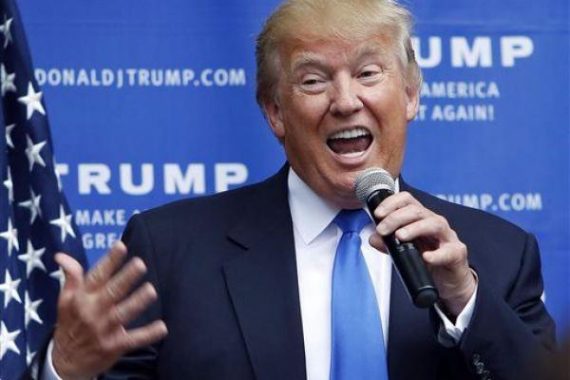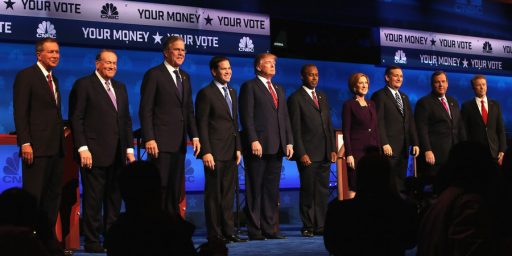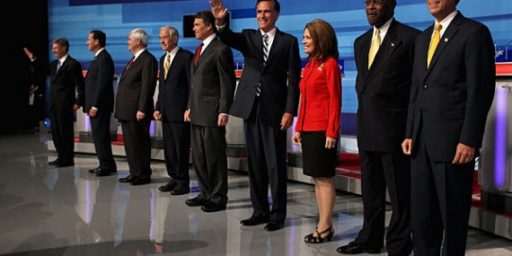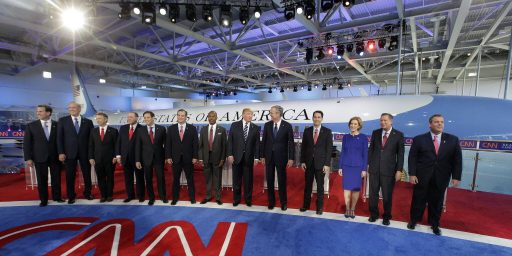Donald Trump Threatens To Boycott Next GOP Debate Over Format Disputes
Donald Trump is threatening to boycott the next Republican debate if there aren't format changes. The GOP should call his bluff.
Donald Trump is apparently threatening to pull out of the next Republican debate if format changes aren’t made:
A Republican National Committee conference call to discuss plans for the Oct. 28 GOP debate with top advisers to the presidential campaigns spiraled into chaos on Thursday afternoon as Donald Trump threatened to pull out of the debate if his demands for the format are not met.
On the call, according to three sources who were on the line, Corey Lewandowski, Trump’s campaign manager, said that if the debate does not include opening or closing statements and is longer than two hours total, including commercial breaks, the real estate mogul would have to reconsider his participation.
Neither Lewandowski nor Trump’s spokeswoman, Hope Hicks, responded to a request for comment.
The fiery exchange was one of many on the 29-minute call, which the RNC abruptly scheduled after several campaigns complained a day earlier about CNBC’s planned format for the Boulder debate — particularly the stipulation that candidates not be allowed to give opening and closing statements.
Two top RNC officials, Katie Walsh and Sean Spicer, began the call by telling campaigns that Chairman Reince Priebus had been in contact with CNBC over the matter of opening and closing statements and by saying his job is to advocate for the candidates and that they wanted to make sure he was clear on what their demands were. RNC officials wanted to know what the “red line” was for each campaign, and whether crossing that line would mean they wouldn’t attend.
Then things went south.
First, Jason Miller, a top strategist for Ted Cruz, said his campaign would consider bailing if there weren’t opening and closing remarks. Then, Chris LaCivita, an aide to Rand Paul, chimed in: “If we don’t have opening and closing statements, CNBC can go f— themselves.”
After Lewandowski spoke, others chimed in — including Beth Hansen, who called the conference call a “debacle.”
Sarah Huckabee Sanders, an adviser to Mike Huckabee, expressed concern that not all candidates would have equal time to speak during the debate.
Then it was Marco Rubio campaign manager Terry Sullivan’s turn. Rubio would be present at the debate — he’d be in Boulder “hell or high water,” regardless of the final decision, but he wanted the campaigns to speak with one voice and agreed with other campaigns on the need for opening and closing statements.
Peter Flaherty, an adviser to Jeb Bush, voiced his position — that the former Florida governor intended to participate in the debate no matter what, but that he’d like there to be opening and closing statements.
Ken McKay, Chris Christie’s campaign manager, expressed concern about stating his position on an open conference call line.
Trump himself took to Twitter to reiterate the position that his campaign advisers apparently took in the conference call:
The @GOP should not agree to the ridiculous debate terms that @CNBC is asking unless there is a major benefit to the party.
— Donald J. Trump (@realDonaldTrump) October 15, 2015
.@CNBC is pushing the @GOP around by asking for extra time (and no criteria) in order to sell more commercials.
— Donald J. Trump (@realDonaldTrump) October 15, 2015
Why is the @GOP being asked to do a debate that is so much longer than the just-aired and very boring #DemDebate?
— Donald J. Trump (@realDonaldTrump) October 15, 2015
The fact that the Trump campaign appears to be united with most of the other campaigns in the demand that there be opening and closing statements makes it seem likely that the format will end up being adjusted in order allow for this. In reality, of course, it probably doesn’t much matter to Trump if he gets to give an opening or closing statement because, as Allahpundit puts it, the message that Trump is delivering in this campaign isn’t all that different from the things he’s been saying for the past thirty years or more, and certainly no different from what he’s been saying throughout the campaign. For the other candidates, though, the opportunity to deliver even short statements at the start and end of the debate could be the one chance their candidate gets to make an impression on viewers free from rebuttal by another candidate or questioning from one of the moderators. Trump’s campaign is likely agreeing with the other candidates about that point in order to gain leverage for what appears to be their chief complaint coming out of the last two debates, namely the length of the debate itself. On this point, I have to admit that the Trump people may have a good point.
The first Republican debate, which aired on Fox News Channel on August 6th, lasted roughly two hours without commercials, with commercials it stretched to nearly two and a half hours. The second Republican debate on CNN on September 16th lasted a full three hours from 8pm Eastern to 11pm, a time that the candidates and their campaign, and even most political pundits agreed was agonizingly long. The length of both of these affairs contrasts with Tuesday’s first Democratic debate, which lasted just over two hours. To some degree, of course, the Republican debates have been longer because there have been more participants; there were ten candidates in the August debate, for example, and eleven in the debate last month. The Democratic debate, meanwhile, was limited to just five candidates. Even taking that into account, though, it strikes me that a two-and-a-half to three hour debate on a weekday evening is just a little bit excessive. Moreover, given the fact that the criteria that CNBC is using to determine eligibility for the main debate is likely to mean that there will be at most eight candidates participating, and possibly fewer, it seems that it would be fairly easy for the producers of the debate to trim down the length considerably without cutting down on the substance.
All that being said, it seems to me that the RNC needs to be careful to appear to be caving in to Trump or any of the other candidates regarding the terms on which they will appear in this or other future debates. On some level, I suppose, Trump probably figures that he doesn’t need the debates as much as the other candidates do and that his absence would likely lead to lower ratings for the debate itself, and he’s probably right on both those points. Additionally, as Harry Enten pointed out on Twitter today, Trump’s numbers in the polls have declined after each debate even though he remains in the lead, so there may be some incentive for him to limit debate time. Given all of that, neither the RNC nor CNBC should let themselves be seen as allowing any candidate, but especially Trump, dictate the terms of a debate. Indeed, my advice to them would be to call Trump’s bluff to some extent, even if they do give in on something like opening and closing statements. In the end, he’s not going to skip the debate because he’s not going to want to miss a chance to perform on a stage in front of an audience. Letting him do that at the same time that he’s dictating the terms under which he’ll do so just plays right into his hands.





That is such a Politico article. You don’t even have to check the link to tell where it’s from. What I want to know is why the OTB article was headlined “Donald Trump Threatens…”? According to the leaked version, it was first Cruz’s, then Paul’s, then Trump’s staff.
Well Pink, it got your attention didn’t it?
It is in the interests of the other candidates to have Trump’s bluffs called. One, it would knock the idea that Trump is a great negotiator which is a major selling point for him and, two, it would benefit the other candidates if Trump wasn’t there. It will be interesting to see how this plays out.
Trump and Carson both threatening.
It just keeps getting better!
Two debates in already, what do they really need to say in opening statements?
Trump is bluffing – he would never turn free face time on TV.
Trump is bluffing – he would never turn free face time on TV.
@ernieyeball: I would have clicked on “Cruz, Paul, Trump Threaten…” or “Republicans Threaten…”. But don’t shoot the messenger.
@Pinky:
Wow, where did you read this alleged leaked version?
Trump and Carson seem to have co-signed a letter with their threat.
Just curious.
My guess is that Trump will soon be insisting on a smaller number of participants for the main debate. He is on record as saying the Democrats had too many people at their debate. Don’t be surprised if in future debates the Donald starts insisting on a 4 or 5 Most Popular Criterion of Eligibility. After all, why have all those losers like Kasich and Christie talking when HE could be talking?
@Pinky: “Trump threatens…” was the headline on 3 articles that I saw on this story. I expect they are all going with Trump because 1) anything that Trump says is click bait and 2) he is the guy who keeps sucking all the air out of the room–partially because “Cruz threatens…” isn’t as click bait-ey.
@Davebo:
@Pinky:
You didn’t answer his question. Link to this “leaked version”?
@HarvardLaw92: http://www.politico.com/story/2015/10/donald-trump-threatens-to-pull-out-next-gop-debate-214837#ixzz3ofGvfdJ1
@Pinky:
Thanks for that. It includes important verbiage that you seem to have overlooked. Specifically:
That certainly makes it seem like a joint effort by both campaigns, given that the letter (singular. one letter …) was written by members of both campaign staffs. You have inadvertently validated Dave’s assertion.
@Pinky:
And Christie, and…
I was confused by your initial comment. After reading the Politico article I’m just confused why you made it.
@Davebo:
@HarvardLaw92:
I don’t know what you guys think I was arguing. I just didn’t want to credit the report as an accurate account. Articles like that get into Politico because someone thinks it’s to their advantage, not because of any kind of investigative reporting or search for the truth.
@Pinky:
So you are operating on the assumption that Politico just made this up out of thin air?
@HarvardLaw92:
In fairness, it wouldn’t have been the first time.
But myself, I’d love to see Trump and Carson bail on the debate.
It would be yet another great twist in a primary that keeps on giving.
Somehow, this all makes me think of this case of total derp.
Sorry, forgot link
@Davebo:
Oh, I fully agree. The GOP has become the political equivalent of world wide wrestling, and we get to benefit from it without having to lift a finger.
@HarvardLaw92: Wow! GOP=WWE (and calling it World Wide Wrestling dates you as a fan). I really hadn’t seen the connection.
OT…but I see Fox News got caught being Faux again…
http://talkingpointsmemo.com/livewire/fox-news-guest-charged-cia
Does CNBC have a horse in this race? Were I them I’d be pretty concerned with keeping Trump and Carson in the debates because the ad time would be worth less without. They don’t have any reason to fight the RNC’s battles for them.
It’s too bad the RNC can’t, say, discourage ten hundred candidates from running for its nomination.
@HarvardLaw92: No. I was just playing fair. I initially suggested that the OTB headline shouldn’t have singled out Trump, and I supported that by pointing to the sequence of events described in the Politico article. But if anyone, including me, used that Politico article as evidence, it’d be fair to point out that the article says only what a few leakers wanted it to, and shouldn’t be treated as authoritative.
Several times I’ve made the comparison between primary season and pro wrestling. This is the stretch that’s not defined by technical ability, but by how the crowd responds to the candidates’ gimmicks. A guy who was a heel four years ago puts on a mask and changes his persona, and the crowd accepts him in his new role. A governor becomes a foreign policy hawk; a Washington lawyer becomes country folk.
While I’m under the notion that this is more about Trump playing power-politics with the RNC…his and Carson’s demands seem a bit reasonable. The three hour debate was too long to hold even my attention, and I eat this stuff up like most people do the sportsballs tournaments. And having at least a closing remark or an opening remark seems pretty logical–candidates want to be able to deliver at least a short message that isn’t framed as a fight with another candidate.
God help me, but I’m agreeing with Trump and Carson.
Look, the purpose of these debates shouldn’t be to allow every random person who wants to run for President free air time, but to have viable Presidential primary candidates discuss the issues of the day. Since these are serious issues, each person will need substantial time to discuss these issues. We also have to have a show of reasonable length. Compromises therefore have to be made.
If I were CNBC, I would have the following format: 2 debates of two hours, with the main one in prime time. The main debate would be the 5 most popular candidates, according to the last 3 weeks of polls. These are the candidates the public wants to hear from.Currently, that would be Trump, Carson, Rubio, Cruz and Bush or maybe Fiorina. The second, Kiddie table, debate would be the next 5 (Bush/Fiorina, Paul, Huckabee, Christie, Kasich). As the rest, they would be tactfully told that the public doesn’t want to hear from them. If you are consistently running less than 1 per cent in the polls, you can’t refute that.
This wouldn’t please everyone ( certainly not the bottom feeders) but it would be at this point the fairest way to fulfill the purposes of a Presidential debate.
They caved:
http://www.cnn.com/2015/10/15/politics/trump-carson-cnbc-republican-debate-threaten-pullout/index.html
It sure looks like everyone is punking the Republican Party establishment these days: Donald Trump, the 40 member House “Freedom Caucus.”
Formal Republican leadership – John Boehner, Mitch McConnell, Reince Priebus – is virtually ignored or considered to be road kill.